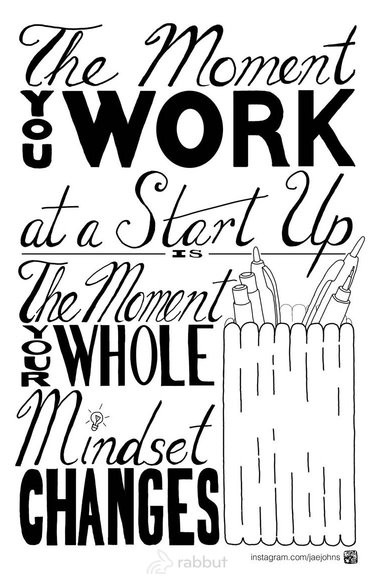It’s time to reveal the other side.
Startups.
The moment this word hits people’s ears, they automatically think — flexible work schedule, a tight-knit team, a unified work culture, unlimited opportunities for learning, the ability to grow a groundbreaking product from a raw idea and so on…
Sounds like an enticing business to work for, doesn’t it?
Well, it totally sold me — after 3 1/2 years of sucking up to bosses, I’d finally quit my 9–5 job to join Rabbut. But to tell you the truth, it wasn’t just those fancy perks that steered me towards this career decision. The real deal-breaker for me was working for a company where I had the opportunity to change people’s futures through the sweat of my hard work. Where I could actually see my imprint. Where I could bring my ideas and stories to those who want to be someone more.
And I have.
But the more I hustled and the longer I stayed with Rabbut, the more distressed I became. No, it’s not the burnouts (if you’re guessing that) but rather, it’s the loneliness.

Image credit to Jae Johns. Instagram: @jaejohns.
If you talk to a startup founder or someone who works for one, you’ll quickly realize how different their mentality is compared to the norm.
- Instead of working hard to get rich, they use growth hacks to speed up their business success.
- Instead of hiring people based off their resume, they hire people based on potential and heart.
- Instead of getting frustrated at life for causing problems, they reflect back and figure out what they could do to fix them.
What you’re seeing is a whole new breed of people who utilize every muscle in their brain to win the marathon. And it’s a tough battle. Because to be in the 10% of the successors, they need to be quick to jump in with bright ideas, be well-aware of every aspect of a business and make risky (but wise) decisions. But one thing they always do is hustle. Every minute, every hour. If they stop, they fall behind — significantly.
That’s why I always work.
Because when I do, I am one step closer to making big money at my startup. Or gain useful work skills if the best case scenario doesn’t happen.
Eventually though, the startup lifestyle starts getting bland. While everyone else is out partying or traveling to exotic places, I’m in front of my screen, blogging. Exposing my business by the thousands. And the more time I invest into work, the less invites I get from people I care about and the more fragile my new relationships are.
At the end of the day, my mind gets sharper, but my social life deteriorates.
To be honest, I’m not too surprised to be someone’s second option or “last resort” when it comes to hanging out. Because unlike most people who schedule a solid plan days or weeks before the actual meetup, I schedule it the night before (or sometimes the day of).
I just can’t help it when my schedule looks like this everyday:
- Work at the office — 14 hours
- Sleep — 6 hours
- Work out at the gym — 1 hour
- Family time — 30 minutes
- Self-reflection of my day — 1 hour
- Shower, text friends, enjoy my “me” time — 1.5 hours
Given what I can squeeze in, 1–1.5 hours isn’t long enough to spark the next hangout.
But even if I did give all the time in the world to talk to family and friends, the conversations would be short. Either they didn’t know what to say when I’d talk about my startup, or my mind would wander elsewhere, seeking new excitement. It’s at that point where I no longer felt a real connection.
The saddest realization behind working at a startup is losing the connection you’d once felt with others due to the work culture you’ve grown accustomed to.
It’d never occurred to me how lonely I’d feel at my startup until depression kept hitting me every week, for the past few months. I wanted so badly to talk to someone who’d understand things on my level (disregarding my teammates), which is why I forced myself to join Meetups, hit up new coffeeshops and invite myself to friends’ house parties.
But no matter where I turned to, the results were always the same — a conversation that didn’t click. A conversation where you’d act interested, but in reality you’d wish you were at home doing your own thing.
This is a problem many startup entrepreneurs face yet remain silent about. It’s not because we don’t want to reveal our weak side; we’re just too busy to think about it. It only hits when we’re finally alone and left to reflect on our lives.
It’s time to step out
I am now working remotely in South Asia to explore new cultures and interact with new and like-minded people who can (hopefully) understand my way of thinking. Completely.
Why South Asia in particular?
For one, there are beautiful and upscale cafes/coffee shops with fast wi-fi on every corner. Perfect for the traveling nomad. Two, it’s ridiculously cheap. Renting a nice Airbnb room for one month ranges from $300–500 USD. Meals cost about $2–3 USD with drinks going for $1 USD or less. Compared to the living costs in Silicon Valley, you can live like a king/queen. Lastly, South Asia is bustling with life. At every waking moment of the day and night, you’ll come across people who are crowding the night markets, dining out at cafes, walking down the streets while chatting with friends or rushing to get to work.
I’m still getting used to people’s way of life here. But hopefully at the end of this trip, I’d be able to build new connections and boost my work productivity (and maybe get my creative juices flowing for writing, too).
This article was originally published on TiffanySun Blog at Medium.com








